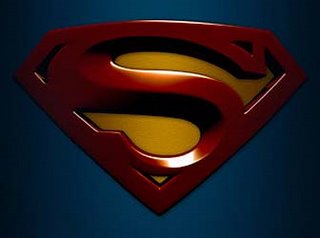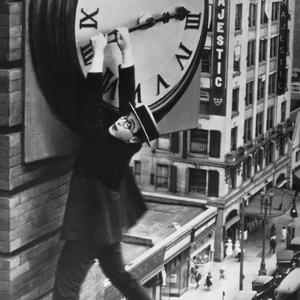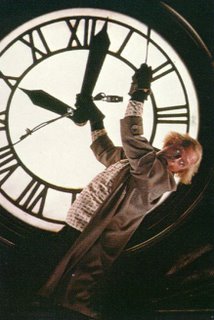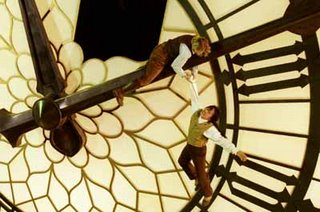
Superman Returns comes out on DVD today. Thus, I thought it would be appropriate to re-print an essay I wrote about the character of Superman back before it hit the theatres. Here it is:
In a few weeks Bryan Singer's Superman Returns opens worldwide and it is a movie that has been a long time in coming (at one point the film was to be directed by Tim Burton, written by Kevin Smith and starring Nicolas Cage; I think I can safely speak for everyone when I say: "Thank God that didn't happen!"). Needless to say, I'm very excited about this event. I realize I'm advertising my hopeless "geekiness" with this blog, but I've long been a "Superfan." He's always been among my top three favorite comic book heroes (the other two being Batman and Spider-man; whoever occupied the number "1" spot depended on what phase of my life I was going through at the time).
In response to the upcoming release, the IMDB (Internet Movie Database) used its "daily poll" feature to ask its members to vote on which superhero was better: Superman or Batman. The results were interesting if, admittedly, not that surprising. Batman got a whopping 67% while Superman only got 15%. 10% said, "I like both equally" and 8% said," I don't like either." I have actually observed, in recent years, that Superman's "approval ratings" have dropped significantly and I couldn't help but wonder why that is. Superman used to be considered the greatest of the superheroes. In fact, Superman was essentially the first superhero, the "Adam" if you will. Without Superman there would be no Batman, Spider-man or anyone else. Superman used to be looked upon with awe. He was admired. He was a symbol for "truth" and "justice" and all that stuff! Why has the Man of Steele fallen into such disfavor in recent years? Why has his popularity waned so drastically and his cultural status declined so monumentally?
Is it the suit? Are the bright blue tights with the red cape, boots and the large red-and-gold "S" not only unimpressive anymore but downright corny? Perhaps its the sheer implausibility of his disguise. While Peter Parker and Bruce Wayne protect their secret identities by wearing masks that cover at least half their faces, all Superman does to become Clark Kent is put on a pair of glasses. Is it just too much anymore to accept that sharp-eyed journalist Lois Lane can't tell the difference between the guy she loves and the guy she works with? Is it the pantheon of powers that Superman possesses? Super-speed, super-strength, x-ray vision, heat vision, flight, super-breath... Do people just think it's too much? Maybe it's the invulnerability in particular. Maybe folks are just tired of Superman not being affected by anything (besides kryptonite of course). Maybe they expect that their heroes be subject to some harm or else there's no suspense. Then again, it might be the villains. Perhaps people prefer a whole rogues gallery of baddies for a hero to combat. I mean, Batman has a colorful array of nasty characters hes constantly fighting (Joker, Penguin, Catwoman, Riddler, Scarecrow, etc), as does Spider-man (Green Goblin, Dr. Octopus, Venom, Sandman, Vulture, etc), while all Superman really has is Lex Luthor (and to a lesser extent Brainiac).
Any one these things could have contributed to Supermans fall from grace, but I think it's something else that has caused him to lose his appeal, something that makes him, in the eyes of today's youth, not quite as "cool" as Batman, Spider-man or Wolverine, something that has actually caused my own personal respect for the character to increase: namely, his righteousness. This is a theory I've been formulating for a while now and I'd like to lay it out now.
Of all the comic book heroes out there, Superman is the only who is naturally good. He has no ulterior motives for fighting crime. Batman's is revenge (he saw his parents murdered when he was a child) and Spider-man's is guilt (he feels responsible for the death of his uncle), but Superman does good for its own sake. He is a truly virtuous, god-like individual, his physical and moral perfection, his extreme strength and incorruptible nature, used to be the very characteristics that made him worthy of respect and emulation. However, the fact that Superman is now referred to as an overgrown "boy scout" (both in and out of the comics) demonstrates that these characteristics have lost their luster. Superman is now considered "dull" or "two-dimensional." Heroes who are darker and more angst-ridden are called "cool" or "a badass." At the very least, they are more complex and therefore more "believable," i.e. there's a greater chance that these characters could actually exist in our own reality.
Understand that I'm not saying that there is anything wrong with these other heroes. On the contrary, I am just as much a product of my culture as anybody else. I love these other heroes. I am very drawn to the inherent drama of the ongoing struggle that Bruce Wayne he has with his own dark self. I also love the realistic, and oftentimes humiliating, problems that Peter Parker has to contend with. I find these multi-layered universes are, in fact, sometimes more interesting than the fantasy world of Superman, but what saddens me is that these worlds and their heroes are now being embraced to the exclusion of Superman. It is understandable that we want our heroes to be more like us (fallible, prone to temptation, at times selfish and weak, etc) but what we are losing in the process is an ideal and that is exactly what Superman is: an ideal. He represents not who we are, and not even who we could be, but who we should be. Superman personifies the type of end goal we ought to strive for, even if we never actually get there.
When Superman does indeed return to the big screen later this month, how the film is received should be an indicator of what we as a culture think of him. Does society still care about exploits of a person who acts completely selflessly, who helps weaker individuals without any sort of desire for personal gain? Is such a superhero still worth our time? Well, here's hoping.
Incidentally, the film was relatively well-recieved by critics (ended up with a 76% on rottentomatoes) and made $200 million at the domestic box office ($390 million worldwide).






